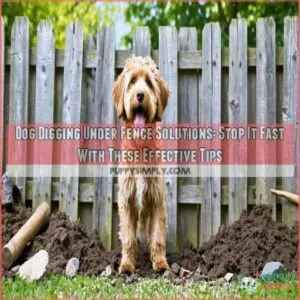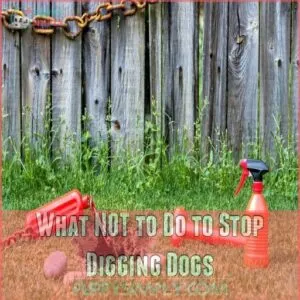This site is supported by our readers. We may earn a commission, at no cost to you, if you purchase through links.
 Got a furry Houdini on your hands? You’re not alone! Dog digging under fence solutions don’t have to be complicated.
Got a furry Houdini on your hands? You’re not alone! Dog digging under fence solutions don’t have to be complicated.
Start by tackling the root cause – many dogs dig because they’re bored or chasing critters. Give your pup more exercise and mental stimulation through walks and puzzle toys.
For immediate results, bury wire mesh or pile gravel along the fence line. Create an enrichment zone with buried treats and toys to redirect that digging instinct.
Smart yard design, like strategically placed rocks or bushes near fences, can transform your escape artist into a content homebody. There’s even a designated digging area trick that’ll make you both happy.
Table Of Contents
- Key Takeaways
- Solutions for Dogs Who Dig Under Fences
- What NOT to Do to Stop Digging Dogs
- Why Does Your Dog Dig?
- Things to Consider Before Installing an Electric Fence
- Keeping Your Dog Comfortable and Confined
- Frequently Asked Questions (FAQs)
- How do you stop a dog from digging under the fence?
- What can I put on the bottom of my fence to keep my dog in?
- Will vinegar stop a dog from digging?
- What can I put at the bottom of my fence?
- What dog breeds are known for digging?
- Can dog training help with this?
- How to stop a dog from digging under the fence?
- How do you dog proof the bottom of a fence?
- How do I keep animals from digging under my fence?
- What is a natural deterrent for dogs from digging?
- Conclusion
Key Takeaways
- You’ll need to address the root cause of digging – whether it’s boredom, prey drive, or anxiety – by providing more exercise, mental stimulation, and regular supervision.
- You can create physical barriers by burying chicken wire 1-2 feet deep along the fence line, adding gravel, or installing concrete footings for persistent diggers.
- You’re better off using positive reinforcement and designated digging areas rather than punishment or harmful deterrents, which can increase anxiety and worsen the behavior.
- You’ll want to combine multiple solutions – like proper exercise, enrichment zones with buried treats, and physical barriers – rather than relying on a single fix to keep your dog contained.
Solutions for Dogs Who Dig Under Fences
If your dog’s turning your yard into a mini excavation site, don’t fret—there are simple simple solutions.
Tackle boredom with more playtime, walks, or puzzle toys.
For digging deterrents, try piling gravel or using stronger fence materials like buried wire mesh for escape prevention.
Yard design tweaks, like adding rocks or bushes near fences, can also stop dog digging.
Effective dog fence solutions often involve a combination of these methods.
Keep a close eye on outdoor time to catch digging early.
With patience and creativity, these underground fence solutions can keep your pup happily confined.
What NOT to Do to Stop Digging Dogs
When your dog’s digging is driving you crazy, it’s tempting to try quick fixes that might do more harm than good.
Knowing what not to do is just as important as finding the right solution—because your pup deserves safe and effective care.
Don’t Punish Your Dog Long After an Incident
Reacting to your dog’s digging spree hours later isn’t just unhelpful – it’s downright confusing for them. Dogs don’t connect past behaviors to current punishment, and doing so can worsen dog anxiety or even trigger fear.
Instead, try this: investing in the right dog training equipment can make a significant difference in their behavior.
- Reward good behavior using Positive Reinforcement – treats, belly rubs, or playtime.
- Offer interactive toys that keep their minds busy and paws away from trouble.
- Address any stress or boredom fueling their digging habits.
- Use gentle Training Methods to teach them appropriate behaviors.
- Build trust – punishment avoidance fosters a calm, happy pup!
Don’t Use Anything That Could Hurt Your Dog
Using harmful methods to stop digging is a big no-no. Sharp objects, harsh punishment, or strong chemical repellents can injure your dog or make them anxious. Nobody wins when your best buddy feels unsafe.
Instead, focus on Humane Deterrents and Non-Toxic Barriers. For example, try filling problem spots with dog-friendly landscaping, like gravel or rocks, to discourage digging—it’s effective and keeps tails wagging.
Providing Safe Digging Alternatives, like a sandbox, can work wonders too. Reward your pup for using it; dogs love approval (and treats!).
Staying proactive is key. Keep an eye on their behavior, but don’t forget basic pet safety tips. Good shade, fresh water, and a happy, enriched pup make digging deterrents way more effective, using basic pet safety tips.
Don’t Leave Your Dog Tethered and Unsupervised
Leaving your dog tethered and unsupervised is a big no-no. As well as leading to injuries or entanglement, it can also ramp up their anxiety.
Instead, focus on supervised play and giving them plenty of exercise to burn off energy. Try using natural barriers like rocks or shrubs to improve fence security while keeping things safe and enriching.
Dogs need mental and physical stimulation—more walks, playtime, and affection will curb digging better than risky dog tieouts or unsupervised tethering. Keep it safe; keep it fun!
Don’t Fill The Hole With Water
Pouring water into holes might seem like a quick fix, but it’s not. Dogs often see it as a muddy invitation to keep digging! Plus, water can mess with soil conditions and damage your fence.
Instead, focus on smart dog digging prevention like digging deterrents or proper fence hole repair.
That’s how you stop dogs digging without making a bigger mess.
Why Does Your Dog Dig?
Why’s your pup turning your yard into a digging zone? Figuring it out is key to stopping the behavior and keeping them secure. Dogs don’t dig just to annoy you—there’s usually a reason behind it. Understanding canine anxiety triggers can also help in addressing digging issues.
- Dog Instincts: Breeds like terriers and hounds dig by nature—think of it as their version of treasure hunting.
- Prey Drive: Some dogs can’t resist the urge to chase after critters.
- Boredom Issues: If your dog’s not mentally or physically stimulated, they might dig just to pass time.
- Anxiety Triggers: Separation anxiety or feeling unsafe can drive them to create an escape route.
- Medical Causes: Health issues or even pregnancy can make digging comforting. Understanding the “why” helps you target solutions and stop dogs digging effectively.
Things to Consider Before Installing an Electric Fence
Electric fences might seem like a quick fix for your escape artist, but let’s explore what you need to know before taking the shock route. Your pup’s safety should always come first. Understanding dog aggression triggers is essential for creating an effective containment system that also addresses potential behavioral issues.
| Consideration | Pros | Cons |
|---|---|---|
| Installation Cost | One-time expense | Professional setup needed |
| Training Time | Creates boundaries | Takes 2-3 weeks minimum |
| Effectiveness | Works for most dogs | May fail during power outages |
Local regulations might restrict electric fence installation, so check your area’s rules first. Remember, while invisible fences can be effective dog containment systems, they’re not magic bullets – proper training and consistent maintenance are essential for pet safety.
Keeping Your Dog Comfortable and Confined
When your furry escape artist keeps testing your fence’s limits, creating a comfortable and secure space can make all the difference in reducing escape urges. Think of it as building their personal paradise where they won’t feel the need to dig their way out. Providing adequate dog shelters is important for their overall well-being and happiness.
Here’s what works for keeping your pup content and contained:
- Set up a cozy shelter with cooling options for hot days
- Create enrichment zones with buried treats and toys
- Install visual barriers to minimize anxiety triggers
- Add designated digging areas with soft, safe materials
Remember, a happy dog is more likely to stay put!
Frequently Asked Questions (FAQs)
How do you stop a dog from digging under the fence?
Bury chicken wire at the fence base, create a designated digging area, and increase daily exercise. Add gravel along the fence line and consider installing concrete footings for persistent diggers.
What can I put on the bottom of my fence to keep my dog in?
You’ll want to install chicken wire or hardware cloth along the fence bottom, extending 1-2 feet into the ground. Gravel or concrete barriers work too, creating an uncomfortable digging surface.
Will vinegar stop a dog from digging?
Like a sour-faced guard at your garden’s gate, vinegar can deter your dog’s digging habits.
Simply spray diluted vinegar around problem areas – but don’t count on it as your only solution.
What can I put at the bottom of my fence?
Install chicken wire or gravel along the fence base, or pour concrete to create a sturdy barrier.
For a natural look, try stacking rocks or burying the fence’s bottom portion one foot deep.
What dog breeds are known for digging?
Terriers, Dachshunds, and Huskies are notorious diggers due to their hunting or working heritage.
You’ll also find Beagles, Australian Shepherds, and Jack Russell Terriers frequently exploring the earth with their paws.
Can dog training help with this?
Yes, training can substantially help curb digging behavior.
You’ll want to combine positive reinforcement with consistent supervision and redirect your dog’s energy into approved activities like designated digging spots or interactive toys.
How to stop a dog from digging under the fence?
Keep your dog engaged with toys, exercise, and a designated digging spot.
Install barriers like buried chicken wire or gravel along the fence line.
Consider extending the fence underground for added security.
How do you dog proof the bottom of a fence?
Attach buried chicken wire extending 1-2 feet below ground level, or install concrete pavers along the fence line.
You can also add gravel at the base – dogs hate digging through rocks!
How do I keep animals from digging under my fence?
Bury chicken wire or hardware cloth 1-2 feet deep along your fence line, and add gravel on top.
You should also evaluate installing concrete footers or L-shaped barriers for persistent diggers.
What is a natural deterrent for dogs from digging?
Studies show 89% of dogs respond to citrus scents negatively.
You can sprinkle orange peels, coffee grounds, or cayenne pepper in digging spots.
Vinegar mixed with water also works as a natural deterrent.
Conclusion
Like training a stubborn puppy, finding the right dog digging under fence solutions takes patience and consistency. Remember, your furry friend isn’t trying to drive you crazy – they’re just following their instincts!
With the right mix of physical barriers, mental stimulation, and positive reinforcement, you’ll keep your escape artist safely at home.
Start implementing these solutions today, and you’ll soon transform your yard from a dig site into a happy, secure space for your four-legged friend.









